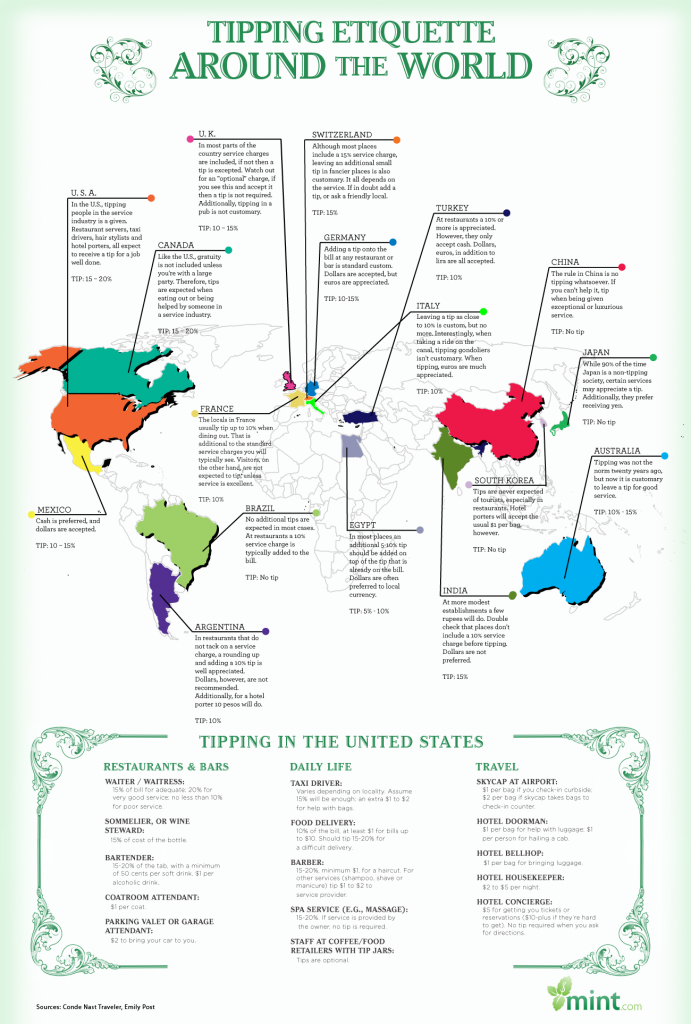
Growing up in the United States, I was brought up with the custom of tipping a minimum of 15% any time we went out to eat at a restaurant other than a fast food joint. And while I always resonated with the opening scene from Reservoir Dogs, it wasn’t until I began traveling that the world opened up to me and I discovered that mandatory tipping was largely only practiced in The West. And it definitely wasn’t until I traveled to Eastern Europe and The Mediterranean extensively – eventually living in Bulgaria for over two and a half years – that I learned the vast majority of the developed world does not tip “just because”, and promptly became a staunch “tip when it’s for excellent service, not simply because they are doing the job their employer paid them to do” Mr. Pink type of individual.
Which, consequently, is why many a serving staff member from the United States has notoriously grown to dislike visitors from foreign cultures, due to the fact that many of them grew up in countries where tipping is not, in fact, mandatory and is very much based on whether or not you are going above and beyond the call of duty when serving a table…not simply showing up and bringing the food and drinks that were ordered.
Ultimately, it’s the responsibility of the restaurant owner, not the customers, to pay the employee a fair wage. If you were working as a nurse in a hospital, for example, and you were unhappy with your wage, you would simply quit and find a new job, or wait until you could find a place to hire you which paid you more per hour. In fact, just about every job position in the world holds this sort of flexibility: if you don’t like your job or your wage, you quit and get a new one.
Only in the serving industry have people become reliant on the customer somehow being responsible for fair wages, and this only in countries such as the United States where the serving staff have allowed themselves to become brainwashed over the years into believing that they are somehow “owed” the tips of customers.
In fact, if you look up the word “gratuity”, which is where the word “tip” comes from, the Merriam-Webster dictionary describes it thusly: something given voluntarily or beyond obligation. Note: something given voluntarily or beyond obligation. The very opposite of mandatory, or “required”.
We can clearly see that tipping someone for their service is, in fact, not a mandatory or required action, but is very much an action taken to reward a person for going “above and beyond”. A person serving your drinks when they are a bartender is simply doing their job. A person serving food to your table is simply doing their job. A person cleaning the table at your restaurant is simply doing their job. So why then do these employees believe that customers should be tipping “just because”?
To put it into perspective, you don’t tip the mechanic for changing the oil in your car; you simply pay the rate they charge. You don’t tip the grocery clerk for ringing up your groceries; you simply pay for your supplies. You don’t tip the airline staff for checking your bags and handing you a boarding pass; you simply pay them the required money for their services. You don’t tip a doctor for checking your temperature and blood pressure; you simply pay the required bill. In all of the above scenarios a person is simply doing their job and making the wage set by the standards of the industry and society they are a part of.
Why are serving staff any different?
The cold, hard truth is that they aren’t. And many cultures around the world realize this, which is why when you are traveling to and living in places such as Bulgaria, you will quickly find that tipping isn’t a required measure by any means. Instead, restaurants are paying their employees a fair, livable wage, comparable to other jobs. Which is exactly how it should be. The employer, not the customer, is responsible for the wage of the individual.
What that being said…there still are cultures around the world where employers do not pay a fair wage and have brainwashed their staff into believing that tips are the way to make up for those lost wages, thus bypassing fair labor policies and government mandated federal minimum wages. The United States is one such place, but there are others to consider, as the list below details.
Of particular note is the fact that even in countries where tipping is a regular part of the culture, most of them do not expect this of visitors. In France, for example, locals may very well tip 10% on top of what is already included in the bill, but visitors (i.e. foreigners) are not expected to tip extra. In Brazil, an extra 10% is usually added directly to the tab as a service charge, and no tips are expected. The same can often be seen in Bulgaria.
South Korea (on this list) is another country where tourists are not expected to tip, nor is Japan, although certain tourist-driven industries (such as hotels and tour agencies) expect them. In Mexico, where I currently live, tipping is much more than simply in the service industry. Grocery baggers, for example, work as volunteers, and for them, tips are how they make a wage. The same goes for the men and women who wave people in and out of parking spaces or help people across busy intersections: they are volunteering and and expect tips.
Rightfully so, I might add, because they are going “above and beyond”. You don’t need a person helping you back your car out into a street, so the person who helps you do so without hitting someone else, as well as steps out into traffic and stops other vehicles so you can back out safely, deserves to be tipped. You also don’t need someone to help you cross the street, but if someone takes the time to do so, you should be giving them a tip for going “above and beyond” (assuming you asked for the help, that is).
Ironically, one of my friends in Bulgaria became such specifically because I was tipping the pizza delivery guys when they would show up at my house if it was less than 20 minutes from my order time. Not much, just a couple of dollars, but for them it’s the equivalent of putting a 10 dollar note. I never did so if they took longer than 20 minutes, but if they could get the food to me quickly and while it was still piping hot, that’s a job well done, and worth a tip. Bulgarians rarely tip, unless they are at a restaurant for 2-3 hours and the staff goes above and beyond, and they almost never tip for deliveries, other than letting the driver keep spare change. After a couple of trips, he was always the guy who would show up at my door with pizzas, and after I got to know him I found out he liked science fiction and fantasy, as I did, and we started enjoying brews together and hanging out. To this day, I still speak with him on Skype regularly, and on Facebook.
On the flip side, when I was back in the U.S. in 2010 for a few months, I went to Old Chicago’s for pizza with my sister. The waitress literally only did two things: took our order, and then brought our waters + pizza to the table. There was a 30 dollar ticket. I paid the tab and stood up to leave, and my sister grew offended because I wasn’t going to leave a tip on the table for the waitress. “Why,” I asked? “All she did was take our order and bring water and the food? What part of her doing her job without any extra service is deserving of a tip?”
From my perspective, there was zero extra service. Why should I be forced to pay a tip when the person is just doing their job? If a waiter/waitress wants me to give them something extra, I expect something extra in return. Small talk. A great personality. Service above and beyond the bare minimum. Make me feel like I’m the only customer in the restaurant, like I’m your favorite, as if my table is the only table in the place. That’s worth tipping for…not the bare minimum of doing your job.
When I was still working in construction back in the U.S., back when I was still a brainwashed sucker giving mandatory tips because I still believed it was required, I had a waitress follow me and two buddies of mine out of a burger pub in Steamboat Springs, Colorado. We had a 30 dollar tab and we left what change we had after we paid our bill: a little over four dollars, or just under 15%. The waitress literally followed us out onto the street and called us assholes (in front of witnesses) for not paying a minimum of 15%. I promptly turned around, told her that if she didn’t like her job she could always quit and find a new one, then went inside, complained to the manager and she consequently lost her job on the spot.
It is not the responsibility of the client to pay a fair, livable wage. It is the responsibility of the employer. That being said, even if tipping is part of your culture, you should understand and realize that foreigners and tourists, people who have never been to your country before, may not be aware of the ins and outs of tipping where you live, and thus you should not be offended when they don’t tip you exactly what you expect.
The above infograph is a good starting point, but it only covers a handful of countries. Something I’ve discovered in my travels over the past 14+ years is that the United States (and Canada) are largely the only two countries in the world where people have grown up believing that tipping is “required”. The rest of the known world largely operates on the basis of tips only when the service is exemplary, and the rest of the time the restaurants pay a fair wage to their staff for doing the jobs they were hired to do.
I personally tip healthily in Mexico where I’ve been living the past going on three years; usually 15 to 20 percent, much to Cristina’s chagrin, as she is Mexican and firmly believes that anything over 10% is more than they deserve for simply doing their job. She has actually made me take part of my tip back off the table before the waiter/waitress comes back to the table on a couple of occasions for over-tipping. And this is from a woman who actually worked for ten years in the service industry before she started working in social media and working online + teaching the Spanish language courses + helping lead the adventure tours in our brand boot camps.
The difference is that here the staff are almost always going above and beyond when they serve their tables. I get much more than minimum service in Mexico. Why? Because they realize that if they don’t do a good job, Mexicans (as a culture) will not leave a tip. The only way they earn a tip is by actually going above and beyond, which is exactly how the tipping system is meant to work. Only in the land of 99%ers and the instant gratification generation do people believe tips should be a given.
Remember, tipping etiquette is something that is “recommended”, not required by any means. As you spend time in more and more countries around the world, you will quickly find that tipping is something which varies greatly country by country, and just because something is a “given” in one country, doesn’t mean it’s the same somewhere else. When in doubt, opt for the 10 to 15 percent bracket, but never tip “simply because”. Make sure you are getting your money’s worth.
Don’t forget to sign up for our free newsletter for several-times-a-week, your-eyes-only travel and entrepreneur tips, plus receive a complimentary copy of our 85-page starter book on location independence and living abroad, 30 Ways in 30 Days.









Thanks for your opinion, Pamm!
Mr. Anderson,
Please do not go and visit a country where it is appropriate to follow the local customs.
Tipping is customary in the US as the employers only pay $2.13 an hour. The employees are taxed on the difference between that and minimum wage. So when you take your high moral ground of protesting an employer policy, you are asking others to pay for your dining experience.
Please stay home as people like you should not be traveling. If you want things to be like they are “at home”, you simply must stay there as the world does not revolve around you and your parsimonious ways.
Sounds like a plan, Cyra.
And Australia is doing it right
Actually what Lee said is valid point. In Australia where tipping is not expected because the staff get paid a fair wage ($20 an hour to work in a bar in NSW!) the cost of food and drink is A LOT higher. But when you are paying your staff $20 an hour, time and a half on Saturdays and double time on Sundays, well, the money has to come from somewhere.
However… the tipping culture in the US is out of control. I have never actually been to the US but from what I hear from Americans I meet, it’s insane. To expect a 15 – 20% tip for just doing your job is outrageous. I live in Spain and I am quite happy with fairly priced food and chucking in an extra euro/rounding up the bill for good ordinary service (two or so for outstanding above and beyond service) at the end of my meal.
That’s a really nice story about how you tipped the pizza guy and you ended up being mates
ABSOLUTELY, Franca! The very word tipping comes from gratuity, which means extra based on service, not “mandatory”. Now, to get waiters/bartenders paid fairly in the U.S…..
The very word tipping comes from gratuity, which means extra based on service, not “mandatory”. Now, to get waiters/bartenders paid fairly in the U.S…..
You raised a valid point here Tim, I totally agree that it is responsibility of the employer to pay a fair wage indeed. Having said that, I worked a s waitress in the past and I have to admit that when I got some tips it was a nice little extra and in some way made me feel like I was doing a good job. It’s also true that not everybody can afford to leave a tip which it doesn’t mean that you aren’t good enough. In my opinion tipping should be completely up to the customers, if they can and they want they are free to leave a little extra, why not?
If employers in the US and Canada paid their employees in restaurants minimum wage I would agree. However many people dont realize that servers and bar tenders are paid FAR below minimum wage. Not to mention they have to ‘pay the house’ a percentage of their sales for working. So the problem isn’t the employees- it’s the employers, not to mention the government, for allowing this to happen.
Moral of the story- when you don’t tip in the US and Canada that server/ bartender has to pay to serve you. So- If you don’t like the tipping culture in the US and Canada – it’s simple – dont go out to eat
@ Lee
True, but this only applies in the U.S. due to the ridiculous prices built into everything.
For example, in Bulgaria I can go out to eat a nice 3-4 course meal (appetizer, drinks, main course, desert) for two and maybe pay $15-$20, including the service charge. The same in Mexico and Colombia. Especially if you use the discount nights (one of our favorite restaurants here in Cancun has 30% off every Tuesday, and one of our favorite Sushi bars has 2×1 rolls every Wednesday night).
In Thailand, you can do it even cheaper. And yet those prices include the service charge, or the “built in” tip.
It’s only in The West that things cost an arm and a leg. Which is also why so many of us digital nomads are living abroad in other countries where we can have the first world amenities and living conditions at a far reduced price.
Can’t speak for the rest of the world, but it seems to me that in the US if the employer was paying equivalent to what a server is making including tips, you would be paying 3 times more for your food than you are now.
@ Mr.
It does indeed take time to break past the mental barriers. Living abroad and traveling helps, because once you get outside of the U.S. you realize that the vast majority of the developed world does not simply give tips based on “because you are supposed to”, but instead give tips based upon whether or not the individual in question is going above and beyond.
COMPLETELY AGREE! Unfortunately, I still can’t get past this internal brainwashing I have so I still leave a decent tip. However, I am working on it slowly but surely. My biggest beef is with the EMPLOYER, not the employee. As you mentioned, why should the public basically pay the owner’s wages for him/her???!!!! Pretty good scam if you ask me.
Better yet, I’ve thought of leaving a note at the table saying something like “You were not given a bigger tip because: A. You didn’t do anything special or above or beyond just putting the plate on my table and B. Because it is your BOSSES job to pay you, not me. Talk to your boss”.